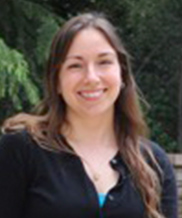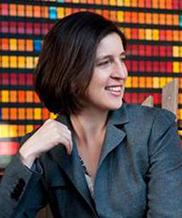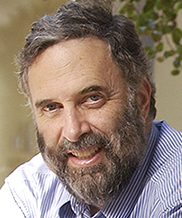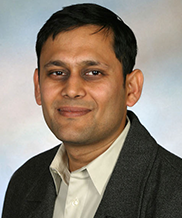Crowdsourcing Democracy and Governance
In this panel moderated by Allison Berke, Executive Director of the Stanford Cyber Initiative, three Stanford thought leaders discuss the implications of algorithms, aggregators, and other computational models on augmenting collective socio-political intelligence. Join Dr. James Fishkin, Dr. Susan Athey and Dr. Ashish Goel as they discuss insights from human sciences and information technology on participatory democracy, news production and consumption, decision making, and public opinion.
 Allison Berke, Moderator : Crowdsourcing Democracy and Governance. Allison joined the Stanford Cyber Initiative as its Executive Director in January 2015, prior to which she worked at McKinsey & Co. in their Business Technology office, advising healthcare payors and providers and biomedical device companies about cybersecurity, strategy, and technology development. She received her PhD in Bioengineering from UC Berkeley, and BS degrees in math and biology from MIT.
Allison Berke, Moderator : Crowdsourcing Democracy and Governance. Allison joined the Stanford Cyber Initiative as its Executive Director in January 2015, prior to which she worked at McKinsey & Co. in their Business Technology office, advising healthcare payors and providers and biomedical device companies about cybersecurity, strategy, and technology development. She received her PhD in Bioengineering from UC Berkeley, and BS degrees in math and biology from MIT.
 Susan Athey, Aggregators, Social Media, and News Consumption. News aggregators and social media affect what users read. They shift consumption from large outlets to small, competing head to head with large outlets to be a curator of news, while sending traffic to small outlets. They lead users to find out about new stories more quickly, and they help users round out their reading on topics that aren’t well covered by their favorite outlets. They also shift the type of articles that users read conditional on the topic. As their importance grows, we should expect to see publishers continue to shift their media strategies in response to these forces.
Susan Athey, Aggregators, Social Media, and News Consumption. News aggregators and social media affect what users read. They shift consumption from large outlets to small, competing head to head with large outlets to be a curator of news, while sending traffic to small outlets. They lead users to find out about new stories more quickly, and they help users round out their reading on topics that aren’t well covered by their favorite outlets. They also shift the type of articles that users read conditional on the topic. As their importance grows, we should expect to see publishers continue to shift their media strategies in response to these forces.
Susan Athey is Professor of Economics (by courtesy), School of Humanities and Sciences. Her research is in the areas of industrial organization, microeconomic theory, and applied econometrics. Her current research focuses on the design of auction-based marketplaces and the economics of the internet, primarily on online advertising and the economics of the news media. She has also studied dynamic mechanisms and games with incomplete information, comparative statics under uncertainty, and econometric methods for analyzing auction models.
 James Fishkin, Making Deliberative Democracy Practical. Is there a way to consult the public that is both representative and thoughtful about difficult trade-offs? By combining random sampling with in depth discussion, the method of Deliberative Polling has produced policy impacts in countries around the world. What can we learn from it? How could it be improved? What are its prospects both face to face and online? Does deliberation provide a form of augmented collective intelligence?
James Fishkin, Making Deliberative Democracy Practical. Is there a way to consult the public that is both representative and thoughtful about difficult trade-offs? By combining random sampling with in depth discussion, the method of Deliberative Polling has produced policy impacts in countries around the world. What can we learn from it? How could it be improved? What are its prospects both face to face and online? Does deliberation provide a form of augmented collective intelligence?
James S. Fishkin holds the Janet M. Peck Chair in International Communication at Stanford University where he is Professor of Communication, Professor of Political Science (by courtesy) and Director of the Center for Deliberative Democracy. His work focuses on deliberative democracy and democratic theory in books such as When the People Speak (2009), Deliberation Day (2004 with Bruce Ackerman) and Democracy and Deliberation (1991). He originated Deliberative Polling as a method of public consultation in 1988. He began to apply it in collaboration with Robert C. Luskin in 1994 and has since spread it, various collaborators, to projects in 23 countries. For more on Deliberative Polling see cdd.stanford.edu. He has been a Guggenheim Fellow, a Fellow of the Center for Advanced Study in the Behavioral Sciences at Stanford and a Fellow of the American Academy of Arts and Sciences.
 Ashish Goel, Political Decision Making at Scale: Algorithms, Mechanisms and Platforms. YouTube competes with Hollywood as an entertainment channel, and also supplements Hollywood by acting as a distribution mechanism. Twitter has a similar relationship to news media, and Coursera to Universities. But there are no online alternatives for making democratic decisions at large scale as a society. We will describe some algorithmic approaches towards large scale decision making that we are exploring, along with preliminary deployments in the context of participatory budgeting.
Ashish Goel, Political Decision Making at Scale: Algorithms, Mechanisms and Platforms. YouTube competes with Hollywood as an entertainment channel, and also supplements Hollywood by acting as a distribution mechanism. Twitter has a similar relationship to news media, and Coursera to Universities. But there are no online alternatives for making democratic decisions at large scale as a society. We will describe some algorithmic approaches towards large scale decision making that we are exploring, along with preliminary deployments in the context of participatory budgeting.
Ashish Goel is a Professor of Management Science and Engineering and (by courtesy) Computer Science at Stanford University, and a member of Stanford’s Institute for Computational and Mathematical Engineering. His research interests lie in the design, analysis, and applications of algorithms; current application areas of interest include social networks, participatory democracy, Internet commerce, and large scale data processing. He was a co-author on the paper that won the best paper award at WWW 2009, and an Edelman Laureate in 2014.